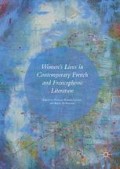Abstract
Jean Anderson’s chapter explores “the identity challenge resulting from dispossession” in the context of autobiographical and fictional texts by Lydia Flem, Hélène Le Chatelier, Pierrette Fleutieux and Annie Ernaux. The transition from family home to retirement home is part of many women’s lives as they outlive both their partners and their physical and/or mental capacity to lead independent lives. As memories of the past become paramount, a change in living conditions (“downsizing”) creates a tension between two opposing impulses, preserving and discarding. Anderson’s analysis demonstrates how material possessions act as “memory keepers” that become “a means of final communication, a ‘dernière adresse’ of considerable value in binding generations together through their mediated narratives.”
Access this chapter
Tax calculation will be finalised at checkout
Purchases are for personal use only
Notes
- 1.
Works featuring an aging parent often feature multiple references to other “last” events or objects, for example, the “dernier sac” (Ernaux, “Je ne suis pas sortie” 17) and “dernière robe” in Fleutiaux (157–164).
- 2.
I would like to acknowledge initial inspiration provided by two papers in a session on mourning and self-writing at the 2010 Women in French conference: Catherine Montfort’s “L’Écriture du deuil chez Pierrette Fleutiaux” and Lynn Penrod’s “L’Écriture du deuil chez Lydia Flem.” See also Montfort.
- 3.
For an extensive overview of research into material possession attachment, see Kleine and Baker.
- 4.
It is to this period, too, that Perec’s novel Les choses. Une histoire des années soixante (1965) belongs. This is clearly reflected in the book’s focus on consumption: none of the objects acquired is given any emotional dimension, in clear contrast to the authors studied here.
- 5.
This concept of a symbiotic relationship between objects and owners is also highlighted by gerontologists, for example, Rubinstein and de Medeiros or Sherman and Dacher who see cherished possessions in the home as “reminiscentia” (Casey 110–111), objects intimately linked to the narrative of self and family members. Although photographs are the most obvious examples because of their directly visual referentiality (see Barthes, La chambre claire, or Hirsch, Family Frames), any object can be imbued with narrative significance.
- 6.
This is the first book in an autobiographical trilogy that continues with Lettres d’amour en héritage (2006) and Comment je me suis séparée de ma fille et de mon quasi-fils (2009).
- 7.
The nuance of “se refuser à faire” (as opposed to “refuser de faire”) is difficult to capture in English: while both mean “to refuse,” the expression Flem prefers here seems to imply that the mother is holding herself back from the task, perhaps as a matter of self-protection.
Author information
Authors and Affiliations
Editor information
Editors and Affiliations
Rights and permissions
Copyright information
© 2016 The Author(s)
About this chapter
Cite this chapter
Anderson, J. (2016). La dernière adresse: Possessions, Dispossession and the Preservation of Memory. In: Ramond Jurney, F., McPherson, K. (eds) Women’s Lives in Contemporary French and Francophone Literature. Palgrave Macmillan, Cham. https://doi.org/10.1007/978-3-319-40850-7_7
Download citation
DOI: https://doi.org/10.1007/978-3-319-40850-7_7
Published:
Publisher Name: Palgrave Macmillan, Cham
Print ISBN: 978-3-319-40849-1
Online ISBN: 978-3-319-40850-7
eBook Packages: Literature, Cultural and Media StudiesLiterature, Cultural and Media Studies (R0)

